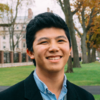Earthquake Science and Active Tectonics
Natasha Toghramadjian research highlighted by Harvard Griffin GSAS Voices
Reginald A. Daly Postdoctoral Research Fellowship - Accepting Applications
Thomas Lee receives 2023 AGU Scholarship
2023
Dec
04
2023
Oct
16
Prof. Roger Fu and his lab's work featured on BBC Podcast
Faculty Job Advertisement in Earth’s Physical Processes: surface, crust, and mantle - Accepting Applications
Reginald A. Daly Postdoctoral Research Fellowship - Accepting Applications
2020
Jan
15





